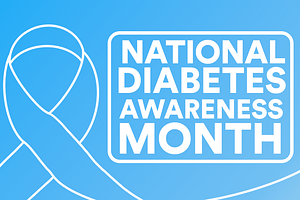 Diabetes Awareness Month: Building a Healthcare Team
Diabetes Awareness Month: Building a Healthcare Team
November is National Diabetes Awareness Month. The focus this year is on managing diabetes by building a healthcare team. This may include your primary care doctor, a nutritionist, a diabetes care and education specialist, a behavioral health clinician, or any other healthcare professionals suggested by your primary care provider. People with diabetes are recognized as the primary member of their own care team. Talking with your health care team about the challenges of managing diabetes is important in order to care for your behavioral health and well-being.
- What is diabetes?
Diabetes is a chronic health condition that affects how the body turns food into energy. People with diabetes either do not make enough insulin, or their body doesn’t use it as well as they should. In the US, more than 37 million adults have diabetes, while 1 in 5 don’t know they have it. There are three main types of diabetes; type 1, type 2, and gestational diabetes (diabetes while pregnant). To read more about the different types, click the following article found on the CDC website: What is Diabetes?
- What are the symptoms?
Diabetes symptoms include frequent urination (often at night), very thirsty, losing weight without trying, very hungry, blurry vision, numb or tingling hands or feet, very fatigued, very dry skin, sores that heal slowly, and more infections than usual. If you have any of the symptoms listed, make an appointment with your primary care doctor to get your blood sugar tested.
- What is diabetes distress?
Managing diabetes is a lot to think about and can often leave people feeling discouraged and overwhelmed; this feeling is called diabetes distress. Diabetes distress can make it difficult to manage your diabetes with increased fatigue, tension, and burnout leading to a higher risk for complications. Fortunately, there are things you can do to cope with diabetes and manage stress. Pay attention to your feelings, talk with your doctor, friends or family about how you are feeling, and ask if financial help is available to pay for diabetes medicines and supplies. For more on coping with diabetes distress, click the following article found on the CDC website: 10 Tips for Coping with Diabetes Distress
- How are diabetes and mental health connected?
People in the US with diabetes experience higher rates of mental health issues, including depression and anxiety. Because thoughts, feelings, beliefs, and attitudes affect your body’s health, untreated mental health issues can make diabetes worse. In contrast, problems with diabetes can make mental health issues worse. The good news is that when one improves, the other often does as well. Treatment, such as talking to a behavioral health clinician, medication, or both, is usually very effective. Talk with your doctor to see if it would be helpful to talk to a behavioral health clinician or mental health counselor to get the support you need.
For more resources on diabetes, check out the following websites:
-Published November 14, 2022
